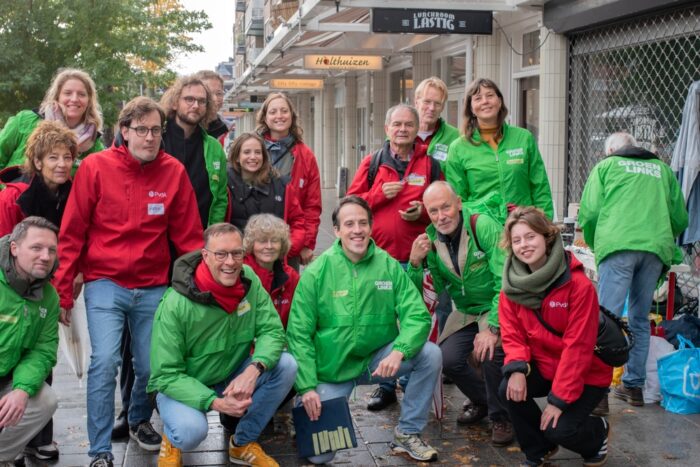The Progressive Post
Anti-corruption as an electoral strategy in Romania’s 2020 elections
The number one topic of the Romanian parliamentary elections in December 2020 was not, as one might have thought, the public health issues raised by the raging Covid-19 pandemic, but the fight against corruption. Both the National Liberals and the Save Romania Union (USR), along with the newly formed Alliance for the Union of Romanians (AUR) forged their electoral strategy around pushing an anti-corruption agenda directed against the biggest party on the Romanian political scene, the Social Democrats (SDP).
Undoubtedly, the intention of this anti-corruption agenda was to capitalise on the aftermath of the massive anti-corruption street protests that took place before the pandemic, between 2017-2019, and also on the perceived precarious economic situation of the country, in order to augment their own electoral performance. The success of this strategy was to push all three parties into the parliament, and to enable the Liberals and the USR to form the new Romanian executive. But one question remains unanswered for the foreign observer who seeks a better understanding of the 2020 electoral process: what does the anti-corruption discourse mean in the specific Romanian context and what is its impact on the Romanian party system?
For more than a decade, Romanian politics have been revolving around the fight against corruption. Ironically, the issue was pushed into the mainstream by former right-wing president Traian Băsescu back in the mid-2000s as a major part of his presidential campaign(s), while he himself was dealing with serious corruption charges. But what was initially populist rhetoric meant to reshape a candidate’s public image, became over time a central issue of the Romanian political agenda.
An apparent cleavage between ‘corrupted’ parties and anti-corruption forces, reformist, and anti-reformists or between pro and anti-European seems to be fracturing Romanian society and politics and structuring the party system as well as the dominant political discourses. As a consequence, this cleavage shapes election outcomes. Moreover, it seems that this cleavage also illustrates the classical ideological divide between the Left and the Right, but with an Eastern-European twist: communist vs anti-communist. For a non-Romanian reader this may seem confusing, probably, because, in reality, it’s not about corruption, but about its understanding within the Romanian political context. Both major parties, the Social Democrats and the National Liberals in Romania have corrupted politicians. For example, the Liberals fell to a new low in 2016, when Baia Mare’s mayor Cătălin Cherecheș was re-elected while he was in prison for bribery charges. On the other hand, the former Social Democrat leader Liviu Dragnea is also serving time since 2019 for corruption charges that took place during his time as President of Council of Teleorman county in 2000-2012.
Therefore, apart from its strict judicial meaning, corruption in the Romanian political context should be understood as more or less a discursive convention referring to several issues perceived as crucial and, interestingly, all of them related to the Social Democrats, who are seen as associated with a certain ‘system’:
Firstly, a lack of modernisation (both institutional and infrastructural): the Social Democrats are held responsible for Romania’s poverty and underdevelopment. Actually, all governments (including the Social Democrats) since the mid-1990’s adopted neo-liberal policies that gradually contributed to the current state of affairs – privatisations, eliminating progressive taxation, closing up hospitals and so forth.
Secondly, the predominance of informal politics in governmental action as well as in grass roots politics. For example, the Social Democrats are accused of protecting the so-called ‘local barons’, of allowing them to control local politics and to push their own protegees into public offices. This however is yet another complex issue that is oversimplified and politicised, as both major parties are trying to attract local barons in order to consolidate their electoral base.
Thirdly, the perceived conflict between two major camps: former communists vs anti-communists. The ‘communists’ are represented in this view by the Social Democrats (also wrongly considered to be heirs to the defunct Romanian Communist Party of Nicolae Ceaușescu), while the anti-communists are literally all other significant political organisations. The Scial Democrats are perceived as defending their privileges and power positions, while the other parties are fighting against them, for the betterment of Romanian society. This ideological positioning lead in 2014 to the chants of “down with communism!” on the streets of Romania and abroad against Victor Ponta, leader of the Social Democrats and presidential candidate at the time. This happened in spite of Ponta’s public neoliberal stance in economic policy and his adherence to Anthony Gidden’s ‘third way’ in terms of social policies.
Fourthly, the alignment with either Russia or the Western world as a strategic foreign policy option became a sort of a mantra for all parties opposing the Social Democrats, who were accused to side with Moscow and the Russian president Putin, and, consequently, to be against the EU and Romania’s national interests. This, again, is untrue: the Social Democrats are one of the artisans of Romania’s Euro-Atlantic integration and, apart from some isolated instances during Liviu Dragnea’s leadership, they never abandoned their allegiance to Western values and institutions.
Thus, the issue of corruption in Romanian politics is a discursive top-down approach to party competition, a discourse in search of an electorate.
In the 2020 elections, citizens rallied across the political spectrum for or against one of the two dominant positions. The notable exception still is the party of the Hungarian minority, the Democratic Alliance of Hungarians in Romania (DAHR) that, due to its loyal ethnical base and its reliable 5 percent of the vote, chose the role of a hinge’ in the Romanian coalition making game, therefore governing with literally all parties of the political spectrum, as long as they agreed to specific policy issues pushed by the DAHR on behalf of the Hungarian community.
The parties and the elections
The reality of the ‘corruption’ cleavage is confirmed by the fact that it shaped the Romanian party system by creating new parties solely relating to this specific topic, engendering two main models of political positioning – a democratic-populist one, embodied by the Save Romania Union (USR), and a right-wing, authoritarian and neo-fascist one, represented by the Alliance for the Union of Romanians (AUR).
The USR is a populist middle-class party relying on the big cities’ electorate (such as Bucharest, Timișoara or Brașov). Initially, its sole message was aimed against corruption, identified with the biggest party in Romanian politics, the SDP. USR initiated a campaign to start a referendum for changing the Constitution, under the slogan ‘Without any condemned people in public office!’, which it is still pushing in 2020. Also, in the 2020 parliamentary elections USR tried to run under another anti-corruption slogan – “a Romania without thievery”. When USR formed, its ideological stance was a mix of left and centre-right leaning ideas professed by politicians and activists that met during the 2017 and 2018 anti-governmental protests.
But that rapidly changed towards a right-wing neo-conservative position (involving neo-liberal economic policies, such as the privatisation of healthcare in Romania and attacking the few remnants of the welfare state still present, doubled by conservative political values, which were best illustrated by USR’s support for the 2018 ‘referendum for the traditional family’, directed against LGBTQ rights). USR’s whole rhetoric is furiously cantered against the SDP (and lately against the Liberals, accusing them of ‘baronial’ informal politics, much like the SDP). One of their last such endeavours was a poll that was cancelled after the revolted respondents posted pictures of the questionnaire in which they were asked if they would accept that friends or family members voted for the SDP. This tactics won the USR (and their allies in PLUS) more than 15 percent of the vote on 6 December. They became the third party in Romanian politics and will partner in government with the National Liberals (which had a similar campaign aimed against the SDP) and the DAHR.
For most analysts and commentators in Romania and abroad, the elections on 6 December produced a huge surprise, by the unexpected success of the far-right Alliance for the Union of Romanians (AUR). Romania appears to be following the footsteps of other EU countries by voting a populist, xenophobic and anti-European far-right party into parliament.
But unlike its counterparts from the West, AUR has different message and electoral base. AUR is a product of the Covid-19 pandemic as well as of the structural crises that have been affecting Romanian society for the last two decades. It is a patchwork of various nationalist right-wing groups that united to fill the spot emptied by the demise of the former Greater Romania Party (GRP) lead by the late Corneliu Vadim Tudor. The main difference between the AUR and the GRP lies in AUR’s more diverse ideological base. While the GRP was an heir of the national-communist ideology preached by Nicolae Ceaușescu during the 1970’s and 80’s, AUR, has multiple influences, that include national communists, neo-legionaries (neo-fascists) and anti-vaxxer sovereignism inspired by the Trump and QAnon movements in the US.
AUR reflects the other side of the anti-corruption discourse, again blaming the SDP for the poverty and the corporate takeover of Romania, and also for the under-development that pushed almost half of the working force out of the country. That is why their electoral base consist mostly of poor regions and low-income Romanians working abroad (often illegally). AUR pledged to reject any political alliances in Parliament, a fact that will present as a serious challenge for any potential ruling coalition with a weak majority such is that formed by the Liberals and the SRU.
The foreseeable future
Perhaps the main consequence of this state of affairs is that the next four years will probably be marked by successive political crises and shifts in the governing coalition and perhaps even talks of early elections in a year or two, as the pandemic will wither away.
SDP is still the biggest party in the Romanian Parliament. They claimed victory, but no other party is willing to form a coalition with them, at least for the time being. As the Romanian president, Klaus Iohannis nominated a declared libertarian as Prime Minister (former Liberal finance minister Florin Cîțu), tensions in Parliament are going to mount, especially during a pandemic that, for Romanians, has no end in sight but endless economic hardship as a result of the long-lasting (and relatively ineffective) restrictive measures taken by the former liberal Prime Minister, Ludovic Orban.




